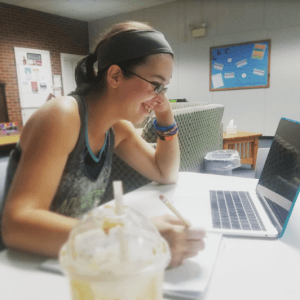
Oct 25, 2018 | Opinion |

Sophomore Alexis Pickens is one of many students who have encountered catcalling on campus (Photo Tania Bureau)
Tania Contributing Writer
Many students at UMF have experienced catcalling on campus, feel that it is disrespectful, and wish it would stop.
Audrey Spear, a sophomore, was walking back from class when a silver car drove by and a guy called out the window and made a comment about her legs. “This made me feel objectictified and disgusting,” said Spear.
Alexis Pickens, a sophomore, hates how she feels after getting catcalled. “It does not make me feel good and it does not make me feel beautiful, it makes me feel very gross,” said Pickens. “When it comes down to it, it is inappropriate and disgusting.”
Claudia Intama says she gets catcalled when she walks on campus. “I live off campus and I walk everyday and sometimes it is really bad bad,” said Intama. “Sometimes people will slow down, roll down their windows, and yell things at me that are very inappropriate, and laugh, ‘ha ha ha’ and roll up their window and keep going.”
Pickens made it clear that women find catcalling very offensive. “It’s not a cool thing to do. I don’t know if it’s because you’re showing off to your friends, or have nothing better to do,” said Pickens. “Either way it is not acceptable, at all. It does not make women feel good about themselves. It certainly doesn’t make them want to date you.”
Intama doesn’t understand the energy it takes to catcall someone when they could just keep driving. “It’s much more than a funny game,” said Intama.“I don’t like it.”
CVPC, which stands for “Campus Violence Prevention Coalition,” an organization on campus that works to prevent sexual violence. There is a lot of facility support, but it is student driven, and is run through student life.
The group “tables” once a month in the student center and organizes activities. “CVPC creates an awareness that there are problems and there are things that we need to talk about even if they make us uncomfortable,” said Intama, who is also works for CVPC. “So really it’s just trying to bring awareness to different issues, that affect us here at UMF, and also affect us as a larger society.”
Intama believes that a way to stop catcalling is education. “Education to get at people that this is wrong and I don’t think that society is at that point yet, and that’s why we are here at CVPC to help educate,” said Intama. “I think awareness is really important.”
On October 26th, CVPC will be tabling for “Purple Day” where students wear purple for domestic violence awareness and prevention. CVPC has a Facebook page where students can leave messages and see future events. https://www.facebook.com/CVPCatUMF/
Oct 11, 2018 | News |
By Tania Bureau Contributing Writer
Two of the residential meal plans students bought this year have a fixed number of meal swipes that they can use in addition to a declining balance points to use for the semester. Meal swipes for the dining hall now end every week and some students feel their money is at risk.
“Last year, the residential meal plans offered were block meal plans,” said Kelsey Champagne-Smith, who is part of Student Life, in an email. The weekly meal plans now run from Saturday to Friday each week.
For the students who have the 10 meals a week or 14 meals a week plan, every time they swipe their cards, either in the South Dining Hall or the Beaver Lodge for meal equivalent, it will take off one of the meals they have for the week.
“I don’t understand why they are doing it,” said Autumn Young, a junior at UMF. “I have 10 meals a week and if they don’t carry over I don’t use them. No point in me paying for them.”
“If students run out of meals before Saturday, they are able to use points or pay with cash in the dining hall. On these meal plans, meals do not roll over from one week to the next,” said Champagne-Smith.
When Young ran out of swipes at the end of the semester she was forced to start using her points. “I’m paying money to have a certain amount of swipes,” said Young, who now feels that the meal plan she has is a “ waste of my money.”
Abby Sanborn is a sophomore Creative Writing major at UMF. “I never end up using all my meal swipes,” said Sanborn, “maybe I will use eight.”
“I’m just losing them,” said Sanborn, who also feels that she is wasting her money. When going to the dining hall, Sanborn feels that she has to pay extra attention to how much she swipes her card. “It is a lot of pressure,” said Sanborn.
In the past there was a trend of students who would run out of meal swipes, some by the middle of the semester, so the meal plan this year was changed to weekly meals instead of yearly.
Sanborn thinks the meal plans should allow for unused meals to transfer over to the next week, so students aren’t pressured and don’t feel as though they are wasting money. “I would like it to transfer over so I’m not wasting money,” said Sanborn.
Young believes that everyone should get the unlimited amount of swipes. The unlimited meal plan, also called the all-access meal plan, allows students to eat whenever they want, at any time in the south dining hall. This plan is also the most expensive meal plan.
“Meal plans can be changed, with the exception of first-year students, during the first two weeks of the fall and spring semester,” said Champagne-Smith.

Sep 27, 2018 | Feature |
By Tania Bureau Contributing Writer
College is challenging when students balance studying, practicing sports, working and getting eno

Sophomore Charlotte Allard combats stress by going to the library to do homework. (Photo by Tania Bureau)
ugh sleep at night. Gavin Pickering, a counselor at UMF, said that while it is important to set times and make schedules, it’s also smart to take breaks and spend time with friends.
“It is important for students to take one thing at a time and not try to multitask,” said Pickering in an email. “Think of yourself as capable to get the work done, and don’t overwhelm yourself. Focus on one thing at a time.”
Two students at UMF dealing with busy schedules and the stress of college life are Joseph Ashby, a freshman, and Charlotte Allard, a sophomore.
Ashby is still adjusting to college. “It is extremely overwhelming,” said Ashby. “Especially playing a varsity sport and having to juggle to get my 16 credits and having three hours of practice everyday.” Ashby is working to find strategies to help with the busy workload. “If I am not in class, I am doing homework and if I am not doing homework or in class, I’m playing soccer,” said Ashby. “I’m always doing schoolwork.”
Both Ashby and Allard have come up with some strategies to help with stress and a busy schedule. Ashby goes to a math tutor through Johnson Scholars, and Allard goes to tutors to have papers read with a fresh pair of eyes.
Allard strives to be organized, making a list of everything that needs to get done, and goes to the library to do homework. Allard finds that writing her notes color-coded also helps with studying.
Allard has found that it helps her to take a short break. “…[During a stressful time] I did something other than homework. I got away from that specific thing and when I came back to it I reread what I had, and it was like, ‘oh, there’s my mistake.’”
Allard also has strategies to unwind. “I stress out myself so bad. When I am mentally stressed and overwhelmed I write in a journal,” said Allard. “I will just like word vomit all of my thoughts, everything I am thinking and throw it on paper and I can get back to what I am doing because my mind is clear.”
Pickering emphasizes that students need to focus on the positives while studying. “Celebrate the work that you accomplish also think about how you will feel when the homework is complete,” said Pickering. “Try to get excited about a task. It gets rid of the voice that says, ‘I don’t wanna,’ which is often the reason work goes undone.”
If you’re struggling with the stress college life brings, you can make an appointment at Counseling Services by go online to the Counseling Service Page on the UMF website, or call 207-778-7034.


